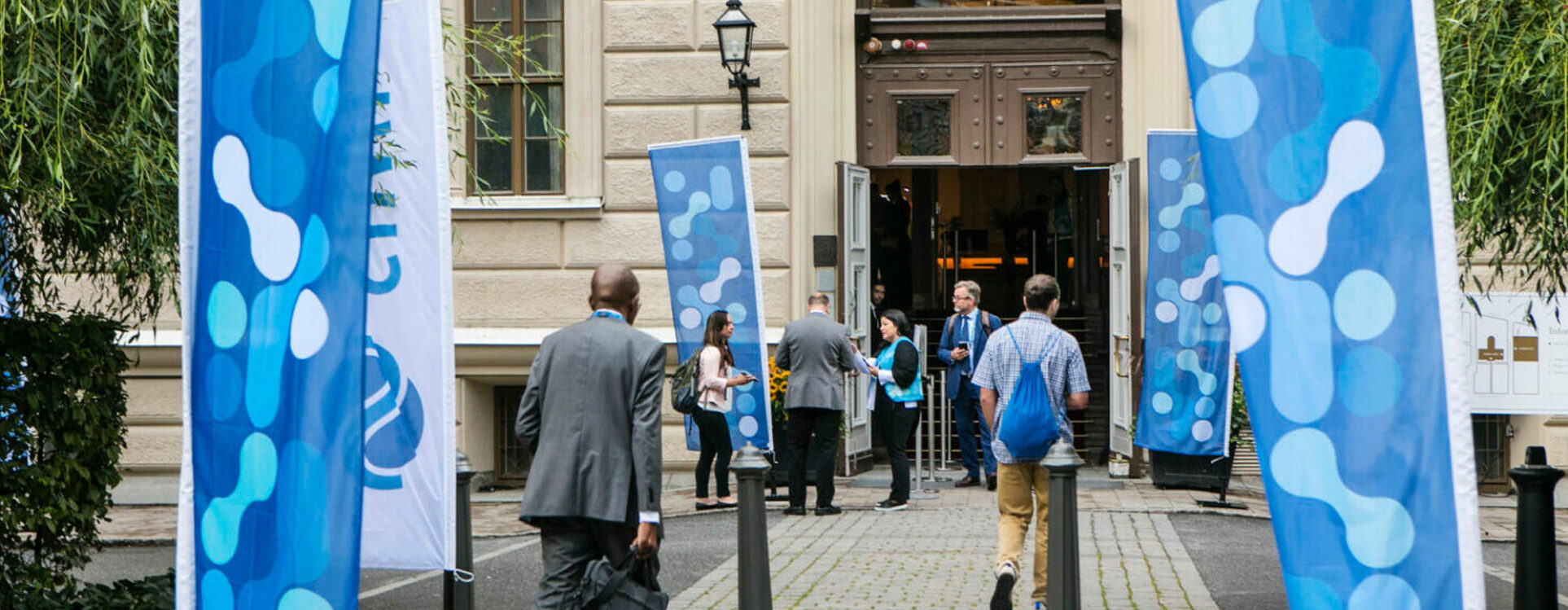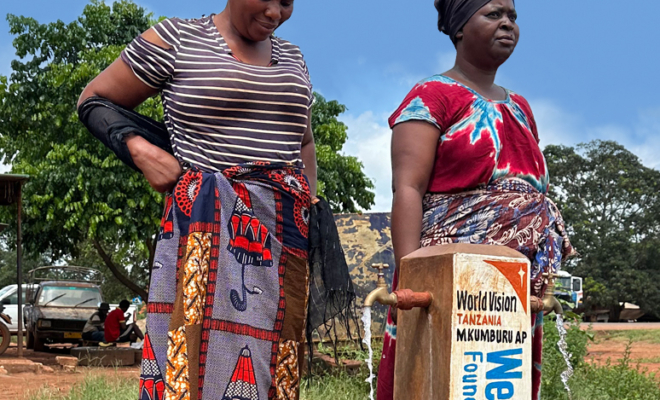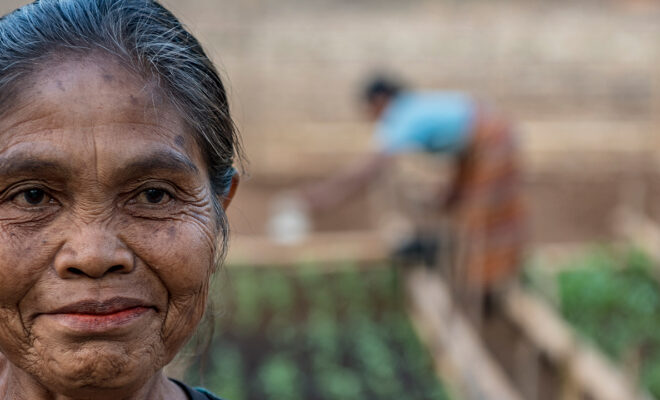The urgency to act on the global water crisis no longer needs further diagnosis: solutions exist, but they demand a profound transformation in how we understand and finance water.
As summarised by Carlos Garriga, Director of the Foundation, at the opening of the session Rethinking the Financing of Water Security during World Water Week in Stockholm: “We must find ways to transform the economy, regenerate it to implement solutions, and this means addressing the gaps in financing and implementation.”
The session, organised in collaboration with ALTAMIRA and WASTE & FINISH Mondial Foundation, marked a further step in the Foundation’s presence at the world’s largest water forum. If last year our contribution was designing financing strategies discussed at the Water for Climate Pavilion at COP29, this edition went further: advancing shared knowledge and exploring new regenerative approaches across the nexus of water, climate, and development.
Understanding Interconnected Challenges
Discussions in Stockholm highlighted a crucial issue already addressed in depth at the COP16 Biodiversity Conference: how to tackle the interconnected challenges of access to water and sanitation, climate change mitigation and adaptation, and environmental safeguards?
Experts aligned with the UN’s push in this decisive stretch to 2030: to trigger a global understanding of reality, plan, and deliver effective and fair financing. These challenges arise in a difficult context of shrinking public resources and limited concessional finance.
Through our 117 projects in 40 countries, the Foundation has seen that successful models can foster community participation and local innovation. Solutions already exist, but scaling them globally requires a new economy: flexible, context-driven, and capable of mobilising both public and private actors toward a shared vision.
Systemic barriers continue to hinder private investment in sanitation, water security, and adaptation; leveraging scientific evidence on the links between climate, water security, and ecosystems is crucial to overcoming them.
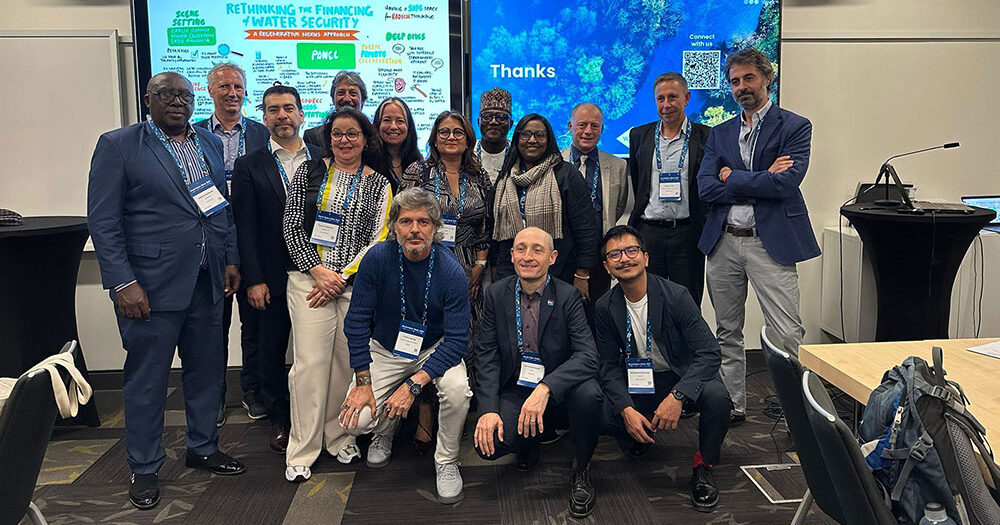
The session, organised in collaboration with ALTAMIRA and WASTE & FINISH Mondial Foundation, marked a further step in the Foundation’s presence at the world’s largest water forum. ©WASTE NL
Democratizing Impact Investment
In Stockholm, Mónica Altamirano de Jong, founder of ALTAMIRA and partner at NetworkNature, emphasised the vital importance of strengthening local capacities: “There is a major opportunity for impact investment thanks to a new generation demanding these projects. To seize it, we need to democratise opportunity, and that largely depends on local capacity to build a concrete vision of what regenerative economy means.”
The collaboration-model expert has consistently emphasised the need to evolve from isolated, budget-centred investment planning processes to an approach grounded in real, direct impact on community well-being. This shift is possible, and to achieve it, we must unlock the potential of public–private partnerships that fully integrate communities in order to initiate a just transition toward a regenerative economy.

“We must find ways to transform the economy, regenerate it to implement solutions, and this means addressing the gaps in financing and implementation.”Carlos Garriga, Director of the Foundation.
From Waste to Resource: Revolutionising Sanitation
There are proven success stories. Nouria Ouibrahim, from WASTE, presented the Diamond Model, a systemic change approach connecting four key actors: the financiers, motivated by the viability of the water, sanitation, and hygiene business; the communities, which drive demand; the supply chains, strengthened through the training of local businesses; and the governments, committed to creating an environment that sustains change.
This model is applied in FINISH Mondial, which is active in six countries (Kenya, Tanzania, Uganda, Ethiopia, India, and Bangladesh), demonstrating that sanitation can become an economic and social driver, not merely a basic infrastructure. Through microcredits and local partnerships, the program fosters a circular economy: what was once waste is transformed into a resource.
As Ouibrahim noted: “True transformation in WASH begins when we invest in whole systems, not just solutions. It is vital we work together to drive inclusive system led change.”
A Success Story from India
Sajib Mahanta, WASTE specialist, stressed: “Impact-driven finance in sanitation isn’t just numbers—it’s about people gaining dignity, better health, and the agency to shape their everyday lives.” He illustrated this with a case from a rural village in India: families built their first toilet thanks to a small loan facilitated by FINISH Mondial. A local company collects waste regularly, converting it into safe compost for agricultural use, while another portion is used to feed a community biodigester that produces biogas for cooking.
The impact is multifaceted: families gain health and dignity; farmers reduce dependence on chemical fertilisers; and new local jobs are created in waste collection and treatment. Sanitation thus becomes a sustainable investment in social, environmental, and economic terms.
Commitment from Major Corporations
Systemic transformation also depends on the private sector, and scale is no barrier. In a workshop with experts, Carlos Velázquez, Sustainability & Service Senior Managing Director at Roca Group, outlined a corporate perspective: “Companies must ask ourselves: what can we do to row in the same direction? The answer is simple and complex at once: be as efficient as possible in water use throughout our production processes.”
He showed how business innovation can unlock water resources unimaginable a decade ago: “In recent years, our company has reduced water use intensity in operations by 58% compared to 2018, and net water consumption in 2024 was 54% lower than in that baseline year.”
Velázquez stressed a crucial point: economic transformation must reach people. “Sustainability goes beyond the environment; we must also pursue a positive impact on people and create prosperity.”
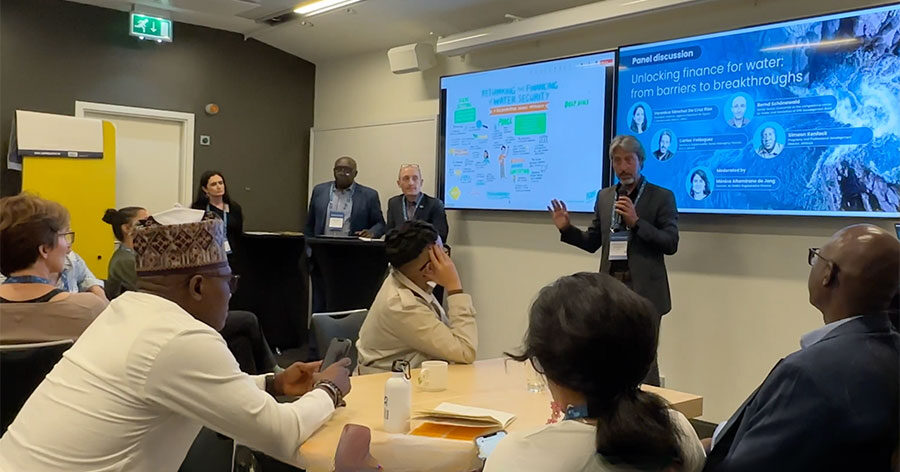
Carlos Velázquez, Sustainability & Service Senior Managing Director at Grupo Roca, highlighted that the key for large corporations is to be as efficient as possible in their use of water in production processes.
From Stockholm to Doha and Belém: A Decisive Year
The session made clear that cooperation and financing are the Foundation for progress. In November, the Second World Summit for Social Development in Doha will test governments’ ability to redefine global priorities on poverty, inequality, and climate change. Just a month later, COP30 in Belém must deliver concrete climate commitments, with a focus on the Amazon and the most vulnerable territories.
One fact stands out: 91% of water spending still comes from the public sector, while private investment accounts for barely 2%. Water cannot remain the weak link in the global financial architecture. We are living a decisive year, and water security will be the litmus test of our capacity to cooperate. Rethinking its financing means rethinking the future.


